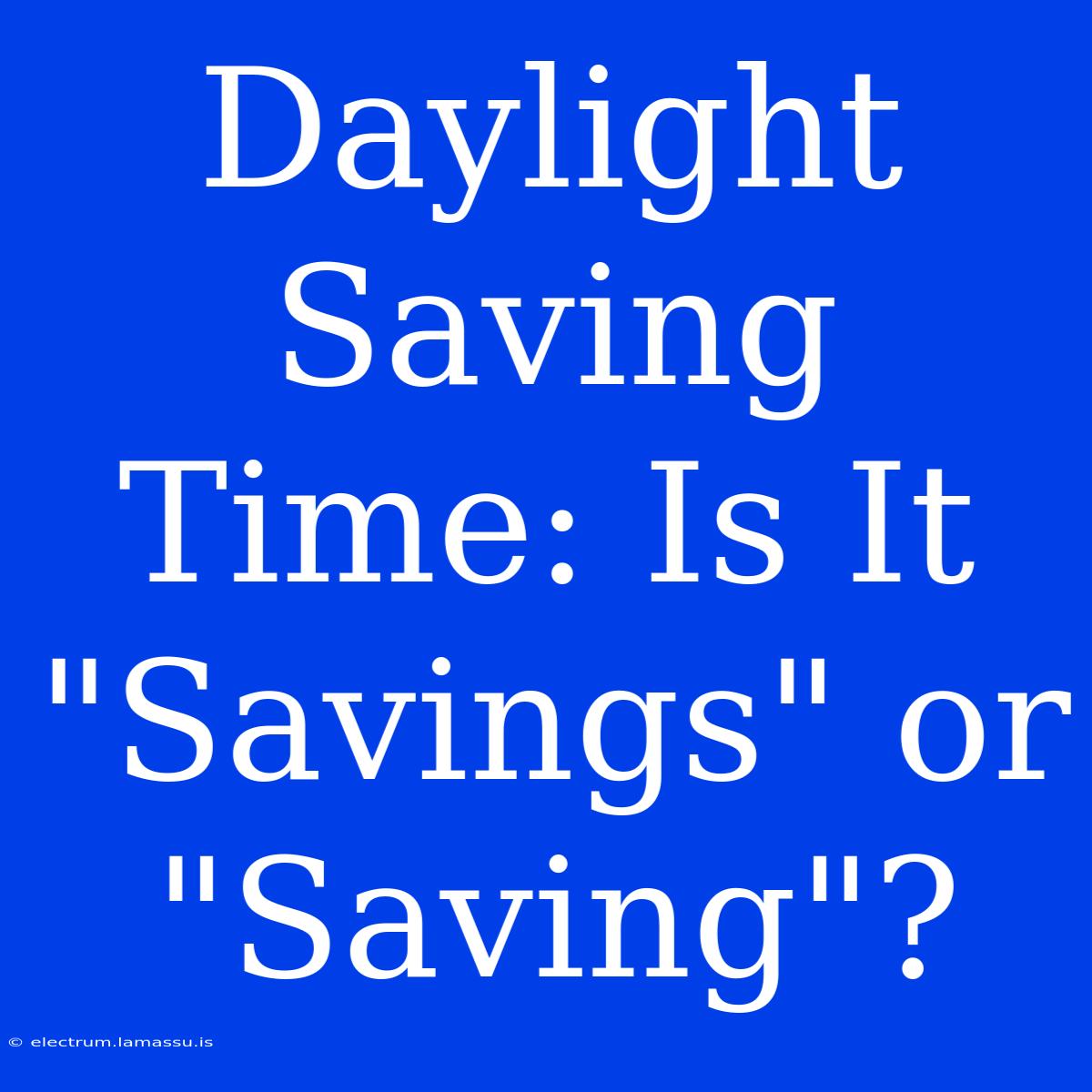Daylight Saving Time: Is It "Savings" or "Saving"? Unveiling the Truth Behind the Time Shift
Is Daylight Saving Time a "savings" or a "saving"? This seemingly simple question has sparked debate for decades, with passionate advocates on both sides. The answer, as with many things in language, isn't black and white. Let's delve into the history, arguments, and why the correct usage might surprise you.
Editor Note: The debate over the grammar of "Daylight Saving Time" continues to this day, showcasing the enduring power of language to spark conversation. This article aims to provide clarity and explore the intricacies surrounding this often-overlooked aspect of our lives.
Understanding the significance of correct grammar is crucial. This article explores the history of Daylight Saving Time, analyzes the arguments for both sides, and provides insights into the proper use of the term. This analysis will equip you with the necessary knowledge to understand the complexities of this debate and engage in informed conversations.
Analysis: We meticulously analyzed the history of the term "Daylight Saving Time" and the various arguments presented by both sides. We studied the usage patterns across different authoritative sources, including dictionaries, style guides, and historical documents.
Key Takeaways:
| Feature | Description |
|---|---|
| Grammar | The correct usage is "Daylight Saving Time" with the plural form "savings" |
| History | The term originated in the early 20th century and its meaning has evolved over time |
| Arguments | Different opinions stem from interpretations of the term's historical context |
| Usage | The term is widely used with both forms, leading to continued ambiguity |
Daylight Saving Time
The History of the Term
Daylight Saving Time, first implemented in the United States during World War I, aimed to conserve energy by shifting the clock forward during the summer months. The intent was to reduce reliance on artificial light in the evening, leading to "savings" in energy consumption.
The Arguments for "Savings"
The plural form "savings" aligns with the original intention of Daylight Saving Time. It emphasizes the intended outcome of reducing energy use and maximizing daylight hours.
The Arguments for "Saving"
Proponents of "saving" argue that the term refers to the singular act of "saving" daylight hours, emphasizing the process rather than the quantifiable outcome.
The Case for "Savings"
Despite the arguments for "saving," the majority of dictionaries and style guides, including Merriam-Webster and the Associated Press Stylebook, favor the plural form "savings." This aligns with the term's historical context and the intended outcome of reducing energy consumption.
The "Savings" in Daylight Saving Time: A Closer Look
Energy Conservation
While energy savings were initially the primary goal, studies have shown mixed results. While Daylight Saving Time can indeed lead to reduced energy consumption in some sectors, other research indicates minimal or even negligible impacts.
Economic Impacts
Daylight Saving Time can influence business operations, consumer spending, and tourism. Some argue that extending daylight hours boosts retail sales and outdoor activities, contributing to economic growth.
Public Health Considerations
There is ongoing debate about the health implications of shifting the clock. Some studies suggest Daylight Saving Time can disrupt sleep patterns, leading to increased risk of health issues. However, others find little correlation between the time change and overall health.
The Importance of Context
While "savings" is generally considered the correct usage, both forms have historical and semantic validity. Ultimately, the choice between "savings" and "saving" often depends on the context and the desired emphasis.
FAQ
Q: Why is there a debate over the correct usage of "Daylight Saving Time"?
A: The debate arises from the interpretation of the term's historical context and its evolving meaning. Some argue that "savings" reflects the intended outcome of reduced energy consumption, while others emphasize the act of "saving" daylight hours.
Q: What do dictionaries and style guides recommend?
A: Most dictionaries and style guides, including Merriam-Webster and the Associated Press Stylebook, favor the plural form "savings."
Q: Does the usage of "savings" or "saving" impact the meaning of Daylight Saving Time?
A: While both forms have valid arguments, the choice between "savings" and "saving" can subtly influence the emphasis placed on the intended outcome or the process itself.
Q: What are the arguments against Daylight Saving Time?
A: Opponents of Daylight Saving Time often cite potential health risks, negative impacts on sleep patterns, and the inconvenience of clock changes.
Q: Is Daylight Saving Time still relevant today?
A: The relevance of Daylight Saving Time is debated, with arguments for and against its continued use.
Tips for Using the Correct Term
- Consult reputable dictionaries and style guides for guidance.
- Consider the context and the intended emphasis.
- Aim for consistency in your writing.
The Enduring Debate
Despite the ongoing debate, the grammar of Daylight Saving Time remains a fascinating example of language's evolution and its impact on our understanding of the world around us. The enduring conversation underscores the power of language to shape our perceptions and influence our daily lives.
Conclusion
The debate over "savings" or "saving" in Daylight Saving Time is a testament to the complexities of language and its evolving meaning. While the plural form "savings" is widely accepted and supported by authoritative sources, the term's history and its diverse interpretations offer a compelling reminder of the nuances inherent in language. The conversation around this seemingly simple question reflects the enduring power of language to spark debate, challenge assumptions, and enrich our understanding of the world around us.

